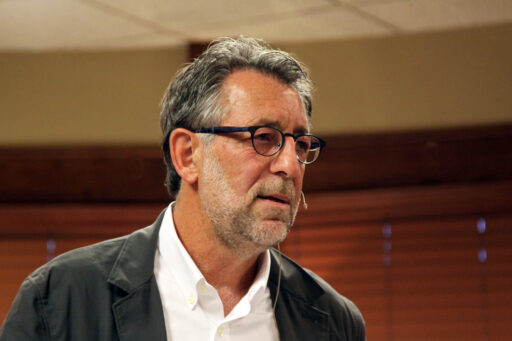We recently spoke with author Scott Cairns about his new Slant book, Conversations with My Greeks
For the benefit of those who may not be familiar with your past essays and interviews, can you tell us why you believe that great poetry is “responsive” to other, prior writings? Isn’t writing about originality and self-expression?
If we think of originality as a text’s bearing the marks of its origins, we get much closer to seeing the matter clearly, and if we were to replace the poverty of self-expression with authenticity—whose Greek language roots derive from a clay vessel’s bearing the marks of the hand that shaped it—we find ourselves moving closer yet to the central issue of creative work in any artform, which is the artist’s entering into a centuries-old conversation and offering his/her/their utterances in response to that centuries-old conversation, duly received and enhanced. As Emerson has averred, “First we read, and then we write.”
As I say, the continuing conversation that is occasioned by serious literature has been going on for centuries throughout the world; the writer who would participate in that conversation would do well to begin by establishing a keen sense of what that conversation entails; thereafter, he or she or they will be equipped to offer an answering utterance, which, if well done, may provoke further response thereafter. Beyond all of that, however, self-expression, as such, is useful only to the extent that a writer already knows everything that the writer wants to know. If I see my primary vocation as being one of dumping into your head what’s already festering in my head, I discover nothing, and you receive only a lazy iteration of my already mulled whine (sic), as it were. I prefer to think of the poem on the page as a scene of meaning-making, a place into which the reader steps, and with which the reader is obliged to collaboratively make new matter.
This book seems a bit different from some of your past collections. The focus on Greek writers is an obvious element, but is there anything else that seems significant to you about this collection?
I think it is different. I think it is comprised of far more personal poems than I have allowed myself to offer in any previous collections. I’ve had something of a mortality wake-up call due to a blood cancer diagnosis that suggests a fairly iffy prognosis. I won’t know for another couple weeks the precise terms of that developing prognosis, but for the past year-and-a-half, my longtime attention to death, in general—and my own death, in particular—, has led to my wanting to make poems that address somewhat more directly what’s going on in my head as I worked on these poems in order to learnwhat’s going on in my head. I especially want to allow my wife and children and others who love me to get a glimpse of that interior dialogue. I think that my approaching “My Greeks” as provocateurs for these utterances has also freed me up somewhat to balance this very personal matter with an established discourse.
So how do these poems work? You read a Greek poem and begin to do what? Imitate it? Translate it?
A good many of these poems actually did begin as attempts at translation, but I learned pretty quickly in those attempts that my own grasp of modern Greek was not up to the task of direct translation. I found myself spending more time fiddling with my lexicon than with the original poems. So, what I began to do was to pore over the Greek of the original, compare my own impressions with existing translations—where they existed—and in a crazy mixture of line-stealing, argumentation, agreement, and general response to what came to mind as I read the Greek and the English versions, I answered these poets with poems of my own. These, then, are my correspondences, my letters to those who first wrote to me.
What attracted you to the Greek writers? Do they share some common qualities and/or themes and if so, what are they?
One thing, in particular, that I’ve long admired about Greek poets, both living and dead, has been their unique disposition toward their precursors and precursive texts, their unique relationship to the Greek myths that they’ve received as their due inheritance. I suppose that to some degree I have coveted that inherited relationship. It is one thing for a non-Greek to riff on ancient Greek myth—and many centuries of world writers have done amazing things by riffing on the Greek myths— it is altogether something else to witness those ancient stories being worked over by a poet whose landscape, seascape, interior life, and—to a great extent—whose language so nearly resembles the language of those stories, the world of the originating texts and oral narratives. Beyond that, I love Greece, and I find great joy among living Greeks; I am pleased by their astonishing and complex appreciation for things philosophical, things theological, and things sensual. They love their rich inheritance of ideas, but also love their “sensual pleasures of food and drink and spirited coupling,” to quote an old poem of my own.
What is it about Greek history or culture that you feel others in North America might benefit from?
Well, for starters: Intellectual curiosity, philoxenía (the love of the stranger), an amazing array of food and drink, multigenerational partying, elegant and earthy dancing at every celebration, a deep religious faith that infuses even the most secular soul, and a general sturdiness that maintains equanimity in the face of serial occupation by imperialists. How’s that?
The Greek Orthodox religious sensibility must play some role in all these correspondences, even if many of the poets you are responding to are not themselves religious, right?
I dare say that, even if certain of these poets may be (some of them famously) disenchanted by the flavor of Orthodoxy that surrounds them (due, in large part, to the regrettable complicity of certain church leaders in apostate and faithless political movements in the twentieth and twenty-first centuries), they were almost certainly all baptized into the Orthodox Christian faith as infants, and virtually all of them received a profoundly religious upbringing. These are deep connections, impossible to eclipse, and even the most secular among these poets writes in response to those deeply embedded apprehensions. In any case, many of these poets have worked over this deep matter directly in their work, many times with great affection and reverence. I remember standing on the plateia of Saint Demetrios Church in Thessaloniki and noting that even as the young motorcyclists sped past the church along the boulevard, every single one of them crossed himself as he passed that holy place.
Where would you suggest that a reader interested in reading Greek poetry go to find resources for that pursuit?
Such a reader must begin with Kavafy, Seferis, and Elytis. Thereafter, for a primer to alert that reader to further and deeper examination of twentieth century Greek poets, I would heartily recommend the edition I mention in my acknowledgements: A Century of Greek Poetry, 1900-2000, selected and edited by Peter Bien, Peter Constantine, Edmund Keeley, and Karen Van Dyck; it is published by Cosmos Publishing. Also, I would suggest a long trip or several to Thessaloniki, Athens, and every Greek island you can get to.





